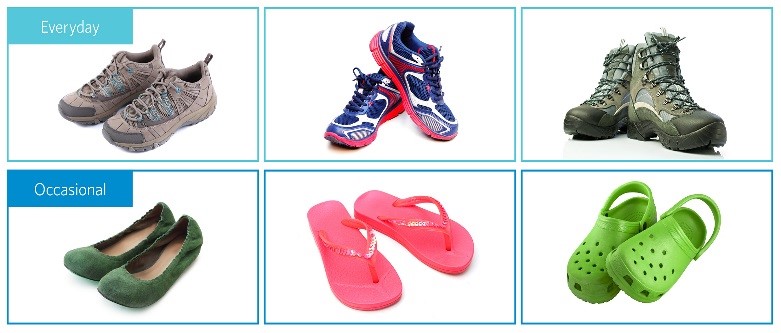Footwear
Everybody wears shoes to protect their feet at home, at school, and around their local community.
There are different kinds of shoes for different activities. Shoes can be functional everyday shoes like runners and school shoes, or occasional shoes like party shoes, special occasion shoes, and thongs/flip-flops/slides.
Everyday shoes support feet best and fit well. They fasten firmly to the foot, are secure around the back of the foot, and have a low heel.
Occasional shoes may not support the foot well. They may slip or slide on, and not fasten securely or enclose the foot, and they may have a high heel.
Everyday shoes are designed to fit your feet, allowing children to walk and play safely. Jumping, running and climbing is easier if your foot doesn’t slip around in your shoe. Walking in everyday shoes is easier, safer, and faster.
Occasional shoes are not for play but are fine for parties, special events, and for going to the beach or pool. Walking in occasional shoes can be more challenging, less stable and slower.
When shopping for shoes, look for:
-
shoes that fasten to the foot with either laces, Velcro, or buckles
-
shoes that do not slip on the foot
-
solid non-slip soles that bend near the toe, not in the middle
-
enclosed back of the shoe (heel cup) to hold the heel
-
a low heel, no more than 2.5cm high
-
space in the front of the shoe, so toes are not squashed
-
adequate room for growth, both length, and width around the toes.
Photo credit: Creative Studios, The Royal Children’s Hospital, Melbourne.
Special considerations
For children with foot and ankle weakness and walking or balance problems, footwear choice is more important.
Shoes that fit poorly can make weakness and balance problems worse. Poor balance is associated with an increased risk of falls.
It is harder to walk, move and play in shoes that slip and do not fasten to the foot. Walking is slower and less stable in occasional shoes.
It is recommended that everyday shoes are worn as much as possible.
Things to remember
- Footwear impacts walking for all children.
- Well-fitting footwear = better walking!
- Walking is faster, easier and safer in well-fitting everyday shoes.

